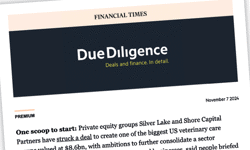
All hail to the Chief
A month ago, a Times splash told readers that Boris Johnson was in “invincible mode”. In the face of the biggest backbench uprising of his leadership, he was going to break an election promise and raise taxes. He was and he did.
Today, there is even more disquiet among died-in-the-wool Conservatives. Supermarket shelves are empty, petrol stations are empty, energy prices – as well as taxes – are rising (while incomes of the poorest five million have just taken a £1,000 dive) and he has all but declared open war with the business community that has traditionally backed his party. And still he seems invincible. He is not so much the Teflon PM, where nothing sticks, as the Kevlar PM that nothing dents.
You might think that with the odds so stacked against him, this week’s Tory gathering in Manchester would expose weak spots where the coating had worn a little thin, but it has instead reinforced the bullet-proofing, even with MPs, party activists and loyal supporters in the shires and the Press shaking their heads and tutting. The whole event has been a masterclass in command and control (quite the feat, given that both have been notably lacking throughout Johnson’s life), with the entire proceedings built around one man.
The Boris Show
Yes, Sunak and Patel got their page leads, Javid and Raab managed the odd top double, but this was The Boris Show from start to finish. From the pre-conference weekend conversations with The Times and Andrew Marr, through the flurry of Tuesday interviews with every broadcaster going, to the laugh-a-minute stand-up routine that constituted his “keynote” speech yesterday, the Prime Minister had a single message: “None of the problems facing the country is down to me, and it’s not my job to deal with them.” But even though it was apparently not his place to do anything beyond cheering the country (especially its successful sportspeople) on, everything was going to be all right because he, unlike his predecessors, had the “guts” to change things.
Over the course of the week we learnt, among other things
- that there was nothing untoward about farmers having to kill their stock and throw pigs into landfill rather than sell them to market;
- that with life expectancy falling and longer waits for critical illness treatment, the “metric that matters” is that wage growth is higher than at any time in the past decade (a period of uninterrupted Conservative rule);
- that at a time of full employment and record job vacancies, businesses could magically find trained staff if they would only pay more;
- that soaring gas and oil prices and increased business costs from higher wages would not lead to inflation;
- that the fact that only 27 (he said 127) HGV drivers from the EU had applied for special visas was proof that the problem was a global shortage rather than a rejection of an “opportunity” to work in a country that has made clear it doesn’t want you, treated you like rubbish last Christmas and intends to kick you out this Christmas Eve.
How the papers saw it
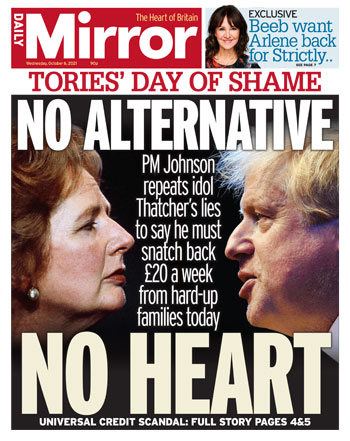
All of this was reported in the papers, both left and right, with varying degrees of credulity. Sketch writers had a field day, news pages were full of warnings of further shortages, business pages had experts lining up to pick holes in his arguments. Yet still the main thrust of coverage on the front pages – the ones that count, the ones you see in the supermarket or on the TV reviews or hear about on the radio – was of what the Prime Minister said (or was going to say), rather than whether it stood up to close examination or basic fact-checking.
The Mirror was an obvious exception, yesterday likening Johnson to Thatcher – he had used her “There is no alternative” argument in one of his many interviews – while the FT focused on the simmering conflict with business. The Guardian was preoccupied with its Pandora Papers (more of those later), but had room down page for a speech prelim whose first six pars included all the upbeat “high wage, high skill, high productivity” predictions of a “bright future”, in spite of concerns about current shortages.

The Express and Telegraph both splashed on Johnson “having the guts to fix Britain”, while Metro went with the apparently contradictory Bob the Builder allusion “Can he fix it? No he can’t”. This diversion from the “official” line being the result of latching on to that Johnson quote: “It’s not the job of government to come in and try to fix every problem in business and industry.” The i was meanwhile back to its vaccine addiction, the Mail was accusing the French of plotting to spoil Christmas (more of that, too, later), the Sun was accusing the French of stealing our vaccines (it didn’t) and The Times was busy showing the Prime Minister’s generous side with “PM to reveal minimum wage rise in a few weeks”.
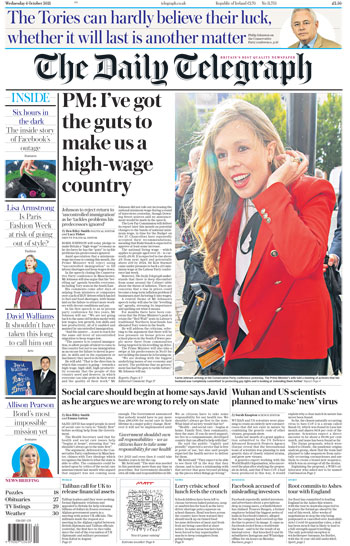
There would, the story said, be a “significant” increase that could be worth £928 a year before tax to someone working 35 hours a week (or around £600 after tax, but the story didn’t mention that). What the story did say – eventually, after its run around what Johnson was going to tell conference – was that the independent Low Pay Commission recommends the new minimum wage rate every year, that the proposals for 2022 are due this month, that the Prime Minister is likely to accept them – as previous prime ministers have done – and that the commission had said itself back in April that the figure was likely to be the £9.42 on which The Times’s £928 calculation was based.
Not exactly news then.
And after he’d delivered his speech, the boosterish banter promising to build back better/beaver/burger lapped up by the audience in his specially fenced off “arena” that took up half of all the conference centre space? Were the papers still with him?
Well, the Express was obviously beguiled by “Iron man Boris” and the Telegraph divined a scintilla of policy – “PM pledges no homes on green fields”. But the Mail and Sun relegated it to the puff while returning to what they do best: talking about itself (the Mail) and Prem stars (the Sun). The Mirror went on the pig cull, the i warned of trouble ahead and the Times found itself in the company of the Guardian in splashing on a business backlash.
Johnson’s glass may not, after all, be half full. Come election time, the Times and Mail will always back the Tories over Labour. But that doesn’t means unwavering support for whoever happens to be the current tenant of No 10. As David Cameron will attest.
The main thrust of coverage on the front pages ... was of what the prime minister said (or was going to say), rather than whether it stood up to close examination or basic fact-checking.
Not forgetting… Labour had a conference too
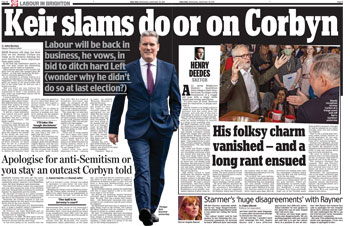
Now here’s a thing. The Daily Mail on first-name terms with a Labour leader? Can you imagine it writing about Tony or Gordon or Ed (as opposed to Red Ed) or Jeremy (let alone Jez)? But last week we had “Keir” in the main headline on a Labour conference spread.
Maybe the familiarity was a sign of approval because he was “slamming the door on Corbyn” (although it irritates me when there’s a mix of forenames and surnames in the same headline) or a warning shot across Boris’s bows?
The Mail takes a “know thy enemy” approach to the Labour party, so the build-up to Starmer’s speech and the coverage of his big day both warranted four pages. There was less on other days, much of it devoted to mischief-making – a “female Labour MP’s ‘naked photos and acid threats against her love rival’” – and, lest we think the paper is going soft, headlines like “Bile-flecked rant from the real party of hate”.
But at least it was there – if driven back in the book by Boris saving Christmas, fuel mania and the small matter of a Metropolitan Police officer arresting, handcuffing, kidnapping, raping and killing a woman walking through a park. I guess you could say that was a slightly bigger news story than what the Labour party might do if it wins an election in three years’ time.
If it wants to do that, I would suggest that an early task should be to get the “loyal” papers on board. While the Tory conference supplied a succession of splashes for all papers, Labour’s gathering produced just one lead each for the Guardian and Mirror. The Times and Mail gave it almost as much inside space as the Mirror.
Of course Angela Rayner’s “scum” jibe didn’t help. That provided meat for the anti-Labour carnivores, which otherwise tried to pretend the conference wasn’t happening. Rayner made the page 1 picture for the Telegraph (and the Times, which like the Mail did its “duty” and granted space if not enthusiasm), but the Starmer speech didn’t merit so much as a nib on the front. One day’s coverage amounted to a spread of two half-pages, another an even smaller page with a giant picture of Rayner (again).
This is the problem Starmer faces. The country is gripped by Johnson, either loving or loathing him. And he is the man in power. What he says and does affects us all. What Starmer says and might do doesn’t – yet. So it’s inevitable that there is a lack of balance in the way his ideas and policies are put across. If he wants to be Prime Minister, he’ll have to find a way of dealing with that.
Violence against women
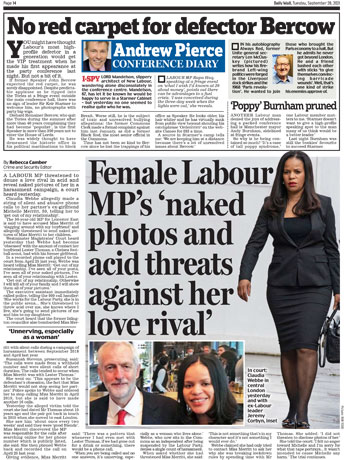
The case of Sarah Everard and Wayne Couzens’s appalling abuse of trust and power have led to much agonising about women’s safety. Too much violence goes under the radar – the Sunday Times ran a chilling spread on 79 women killed since Sarah died – and this needs to get a higher profile than is afforded to Karen Ingela Smith’s Counting Dead Women (which at least got some coverage in the daily last week). Jess Phillips reads out the list of names in Parliament every year and a not-packed house bows its head in respect/contemplation/boredom. Priti Patel and Boris Johnson “vow” to bring justice to women and make them safe; Dominic Raab shows that he has as much understanding of misogyny as he does of the proximity of Calais to Kent. But nothing happens. Can the Press do anything to help?
Well, yes, there’s one small thing it could do straight away that requires absolutely zero effort. Look again at that mischief-making headline above. Why was it necessary for it to say “Female” Labour MP? There is a photograph of her. The word “her” is in the very same headline. If our newspapers could break the habit of treating women as a species apart that have to be identified as such, perhaps men in general and politicians in particular would too.
The Mail & Dame Cressida
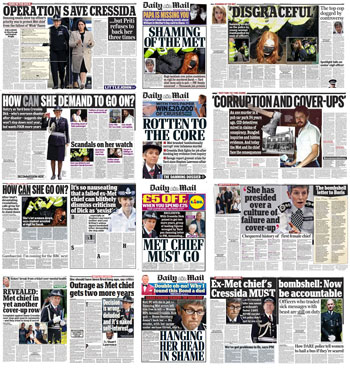
The Mail is known as a “woman’s paper”. It sells to women and prides itself on knowing what will interest “them”. Yet it doesn’t like them much. Its schtick is to make women feel bad about themselves – for being too fat, too profligate, too lazy, too busy going to work or the spa to be good mothers. The list goes on. It doesn’t like Emma Thompson. It doesn’t like Cherie Blair. It’s not quite sure whether it likes or dislikes Nigella Lawson. But it surely despises the Metropolitan Police Commissioner.
Cressida Dick could certainly be described with that over-used journo’s adjective “beleaguered”. Her force has certainly not covered itself in glory under her watch. And the Mail has certainly been on her case. So, it’s a pity that the Mail is so subversively sexist, leaving it vulnerable to accusations that its hostility towards the Met chief is down to her gender. Because it has a point with Dame Cressida. Which it has made many times. Here are a few examples from this year.
Go on, Geordie. Tell us what you really think of her.
Absolutely nothing to do with Brexit
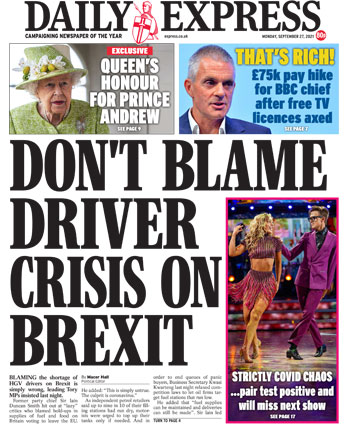
“Don’t blame driver crisis on Brexit”, came the instruction from the Express last week. People who put hold-ups and shortages down to the vote to leave the EU were “lazy” critics, according to “leading Tories”, including Iain Duncan Smith, who asserted: “The culprit is coronavirus”.
The other Conservatives quoted were Peter Bone and Andrew Bridgen, both ardent Brexiters, who pointed the finger at the CBI and industry leaders. For the past five years, this trio have found Express reporters’ notebooks ever open to record their views on the failings of the EU, so I found it hard to suppress a smile at Bridgen’s swipe at “the usual suspects” attacking Brexit.
Inside, the Express editorial shifted the blame from the pandemic to a “significant selfish minority” of stockpilers, who “probably still had cupboards full of excess toilet rolls from the first lockdown”, and to the “empty arguments” of those who had “deliberately stoked the panic” to blame the crisis on Brexit, people who would “happily see the country crippled if they thought they could say ‘I told you so’.”
So far, the “petrol crisis” has been blamed by various ministers on a global hiring problem, the pandemic, panic buyers, an industry dependent on low-paid immigrants, a Road Haulage Association executive who happens to be “a former BBC man who is a diehard Remainer” – and the media, for daring to report that BP was rationing fuel in the first place.
It is clear that there is no serious fuel shortage and that a delivery blip has been exacerbated by people who usually buy petrol every couple of months dashing out to fill up “to be safe”. But there are shortages – of drivers, poultry pluckers, abattoir workers among other things – that are leading to gaps on supermarket shelves that are not evident in other countries. To pretend that a pandemic – which, by definition, affects the whole world – is the root of a situation that doesn't exist anywhere else is perverse.
What is even more perverse is the succession of “Boris will save Christmas” headlines, as though any threat to the festive season comes from some mysterious malignancy (or the French) that had absolutely nothing to do with him and was beyond his control.
And of course all those stories about the need to save Christmas are just going to drive people to the shops to buy up everything in sight and make those shelves even emptier.
I think that is what you might call a vicious circle.
To pretend that a pandemic – which, by definition, affects the whole world – is the root of a situation that doesn't exist anywhere else is perverse.
News is news is news
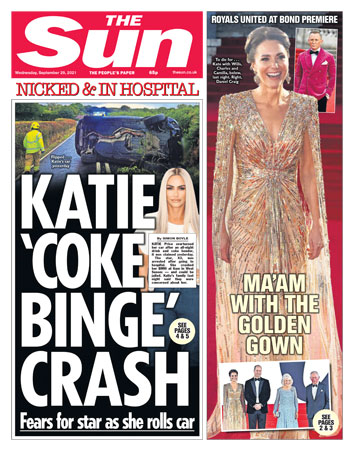
What is the Press supposed to do? It’s easy to point the finger at papers for making matters worse, but they can hardly ignore what is happening in front of everyone’s eyes. There really does need to be a good reason not to cover a story that you know will affect or interest your readers.
There are, however, many sins of omission or double standards. The Meghan fan club will detain you longer than the Ancient Mariner detailing the iniquities she has suffered in comparison to Kate. “Imagine if this had happened and Corbyn had been in charge...” is a notion that could be applied to any number of events over the past couple of years. All manner of social injustices lie unaddressed while papers fret over pensions, inheritance tax and care of the elderly.
But still the principle holds: stories should not be suppressed.
Which is why I cannot join in the condemnation of the Sun for leading on Katie Price’s latest misfortunes. I know she is vulnerable and hope she gets the help and guidance she needs. I understand the haunting tragedy of Caroline Flack. But when a woman who has built her life on being in the spotlight – she isn’t “just” an actress or model, she has chosen to expose herself in a series of reality shows, most recently Masterchef – crashes her car and is arrested in such circumstances, there is no way the story could be tucked away on page 94.
Pandora: pick & mix
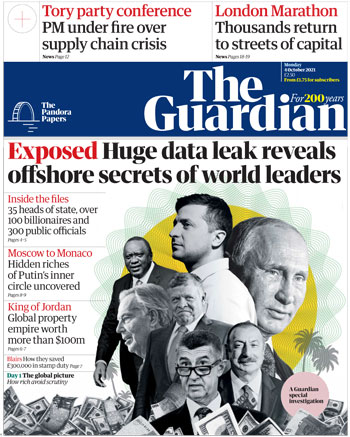
So much for not hiding a story that interests the public. The other side of that coin is hiding a story that is in the public interest. And here the Sun comes out less well.
On Monday, the Guardian published the first pickings from the latest megaleak distributed through a journalistic consortium that includes more than 160 news organisations worldwide, the BBC among them. As with the Panama Papers of a couple of years ago, billions of documents have been made available, detailing shadowy financial dealings among the rich and powerful.
The first instalment was headlined, “Exposed: Huge data leak reveals offshore secrets of world leaders” and tagged “Day 1: The world picture. How the rich avoid scrutiny”. The leaked files apparently named 35 world leaders, more than 100 billionaires and 300 public officials, and a striking front page featured a composite of seven men, with Putin’s the biggest face. There was no caption to identify the others, but Tony Blair was just about recognisable. The smallest of the five front-page headings was “Blairs: How they saved £300,000 in stamp duty”. That story appeared on page 7, the second element on the second of four inside spreads. The Guardian trades in worthy, not what is more widely regarded as newsworthy.
Naturally, the Blairs’ (legal) tax avoidance was the story everyone else picked up.
The Tory angle
On Day 2, the Guardian again ran a splash and four Pandora spreads – this time all of them focused on one subject: Tory party donors, most notably Russians with links to Putin.
This time, the material was picked up by the Mail, Times and Mirror – but there was not a line in the Express, Telegraph or Sun. Maybe because it was an embarrassment with the party conference going on? Well, it didn’t seem to embarrass the Prime Minister, who calmly batted away the rare awkward questions, saying all donations were strictly vetted – under procedures put in place by a Labour government.
Yesterday brought more scrutiny for the Tories – this time the way an offshore film financing company owned by party co-chairman Ben Elliot benefited from £121k in tax credits. This didn’t seem like a huge sum or particularly heinous in the grand scheme of things – but was surely worth a little digging, especially given other cronyism allegations that have been laid at Elliot’s door. The Times and Mail thought so – but only as a subsidiary to the more “general interest” story: Philip Green’s wife spending a lot of money on houses as BHS went under. The Mirror, Metro and Express (five pars) all covered Green, but not Elliot or any aspect of Tory finances; the i focused on a Qatari angle with Green secondary. The Sun and the Telegraph wrote nothing, with the Telegraph’s silence particularly odd, given its previous pursuit of Green and its role in his downfall.
Today, however, Pandora has been downgraded even by the Guardian, where it takes second place to business anger at Johnson’s “bombastic and vacuous” speech.
For the past three days, political allegiance has come first for the Tory-supporting papers. Today, the Guardian demonstrates that the reverse can also be the case.
Naturally, the Blairs’ (legal) tax avoidance was the story everyone else picked up.
Covid – remember that?

Has it gone? Is it safe to come out? The politicians are back, Strictly is back. Have we seen the back of Covid?
You might be forgiven for thinking so. Apart from the i’s assiduous noting of every twist and turn in the vaccination / holiday rules, most papers have pushed the pandemic way into the book and few are bothering to note the daily statistics.
Can you imagine two coachloads of people dying, thousands being taken to hospital and tens of thousands being injured going unremarked? Yet that is what is happening every day. Yesterday, the Sun told us in a chirpy page 2 starbust virus that 166 people died with covid on Tuesday and that 33,869 new cases had been reported. The Mail had a three-par story at the foot of page 12 about Neil Ferguson – “Professor Lockdown” – saying further restrictions might be needed if infections continued to rise. The Guardian relegated its coverage to page 25, the Express to page 17. The BBC nightly tells us how many people have died that day, how many are in hospital and what percentage of the population has been vaccinated, but even it fails to say how many actual needles have gone into arms or keep a running total of how many have ended up in the mortuary. Scary Covid figures are just so last year. Only the Times seems to show sustained interest, with its daily graphics keeping tally here and around the world: by yesterday there had been more than 137,000 UK deaths from 4.26m cases.
World beaters, really?
But even this only tells half the story. Boris Johnson said in his speech that Britain’s speedy roll-out of the vaccine had contributed to the country’s position as the fastest recovering member of the G7. It now seems to have become accepted as absolute fact that we are the world leaders when it comes to vaccination. We’re all vaguely aware of vaccine resistance in France – Macron having to put in special restrictions and incentives to persuade people to get jabbed – so who would have thought that almost as many French citizens as British are now “fully vaccinated”? Well, according to Johns Hopkins, whose statistics form the basis for the Times graphics, 67% are in France, against 68% here. We’re both ahead of Germany, the US, Austria and Greece, but behind Italy (68.5%), Belgium (73%), Ireland (74%), Denmark (75.2%), Spain (77.7%) and Portugal, which is way out in front at 84.7%.
And is everyone suffering the sort of infection rates we are seeing here? Well, case numbers may well be an unreliable barometer, since each country logs them in different ways, but as a matter of interest, the daily average for the past week for the UK has been 33,317 – more than ten times as many as Italy. And deaths? Our daily average over seven days to yesterday was 111, more than double that of any other European country. Shouldn’t we care?
New cases / deaths
Denmark: 426 / 3
Ireland: 1,204 / 4
Austria: 1,861 / 8
Belgium: 1,908 / 8
Portugal: 730 / 16
Greece: 2,192 / 33
Spain: 1,896 / 38
France: 4,653 / 44
Italy: 3,080 / 47
Germany: 7,986 / 54
UK: 33,317 / 111
*Seven-day average daily figures
Thrifty Kate?

Plenty of admiration again this week for the Duchess of Cambridge – for her glamour and glitz at the premiere of the new Bond (while Boris is busy saving Christmas, 007 is saving the cinema) and for her down-to-earthness on a visit to UCL. There “Thrifty Kate” was commended for wearing a past-season dress she picked up in the Zara sale for £16 a while back (reduced from £89.99). Quite the bargain. It wasn’t so much the dress that caught my eye as the mock-croc shoes. These, the Mail informed us, were by Hugo Boss. But it didn’t mention the price tag: £350.
Front page of the fortnight
The Guardian may have produced the most original and exclusive covers for its Pandora Papers, but The Sun wins it again for me with this take on the petrol crisis. Partly because it is so unusual for the paper to question the Prime Minister, but mostly because of its simplicity.
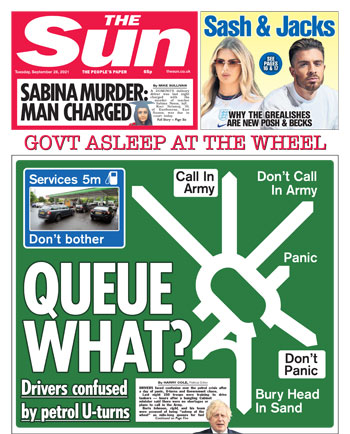
And for acuity, the Times cartoonist Peter Brookes on Saturday was unbeatable.
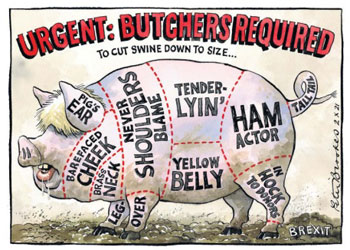
Liz Gerard’s Notebook is a fortnightly column published in the InPubWeekly newsletter. To be added to the mailing list, enter your email address here.








